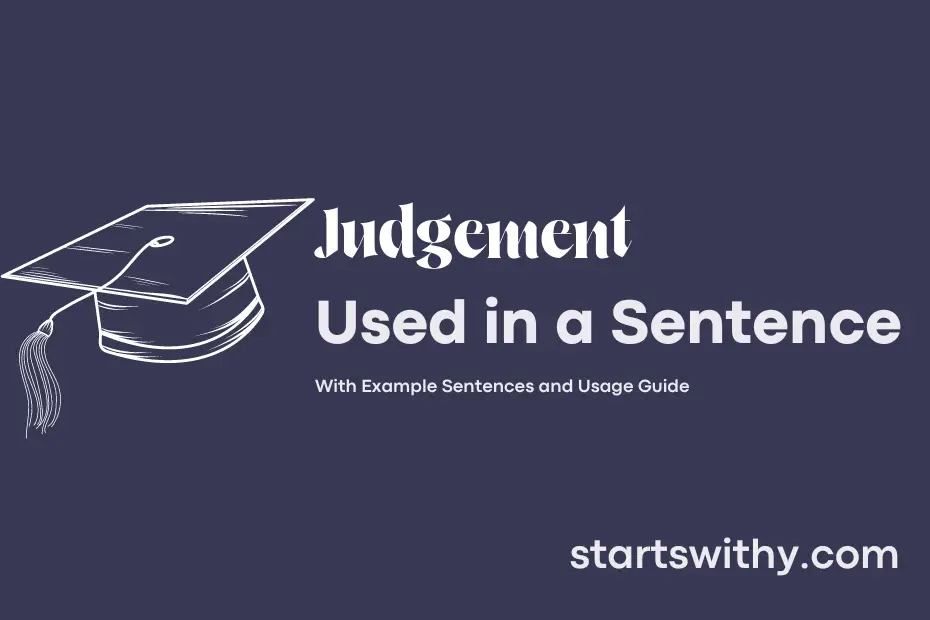Have you ever hesitated to pass judgement on someone or something? Judgement, simply put, is the act of forming an opinion or evaluation based on careful consideration.
When making a judgement, individuals weigh the information available to them and come to a conclusion. It’s a fundamental aspect of decision-making and critical thinking, influencing choices and perceptions.
7 Examples Of Judgement Used In a Sentence For Kids
- Judgement helps us decide what is right and wrong.
- We should not make judgement based on someone’s appearance.
- It is important to be fair when making a judgement.
- We should always think before we make a judgement about others.
- Kindergarten is a place where we learn about making good judgement.
- We should listen to both sides before making a judgement.
- It is okay to ask for help when we are confused about making a judgement.
14 Sentences with Judgement Examples
- Always think twice before making a judgement about someone’s character based on first impressions.
- It’s important to seek guidance from professors or mentors when faced with tough academic judgements.
- Avoid making rash judgements about career options and take the time to explore different paths.
- Be open-minded and consider different perspectives before passing judgement on controversial topics.
- Don’t let peer pressure influence your judgement when making decisions about your future.
- Seek advice from career counselors to make informed judgements about internship opportunities.
- It’s crucial to carefully evaluate sources before forming a judgement on research findings.
- Avoid making quick judgements about the credibility of information without verifying its reliability.
- When facing difficult situations, take a step back and reflect before making a judgement.
- It’s important to develop critical thinking skills to make sound judgements in academic and professional settings.
- Be cautious of social media posts that could lead to making hasty judgements about others.
- Attend workshops on ethical decision-making to enhance your ability to make fair judgements.
- Seek feedback from professors on assignments to improve your judgement when choosing research topics.
- Learn to differentiate between personal biases and objective judgements when analyzing information.
How To Use Judgement in Sentences?
When Judgement in a sentence, it is crucial to understand its meaning and usage. Judgement refers to the act of forming an opinion, decision, or evaluation about something. Here is a helpful guide on how to correctly use Judgement in a sentence:
-
Choose the appropriate context: Make sure the word Judgement fits the overall meaning and tone of your sentence. It is essential to use it accurately to convey your message effectively.
-
Use it as a noun: Judgement is most commonly used as a noun in a sentence. For example, “Her judgement of the situation was accurate.”
-
Context matters: Consider the context in which you are using Judgement. It can refer to making a decision, discerning between right and wrong, or even a legal ruling.
-
Avoid confusing it with “judgment”: Be mindful of the spelling variations, particularly in British English where “judgement” is commonly used. Both spellings are correct, but it is essential to be consistent in your writing.
-
Practice makes perfect: The more you practice using Judgement in sentences, the more comfortable you will become with its proper usage. Experiment with different sentence structures to enhance your understanding.
By following these guidelines, you can effectively incorporate Judgement into your sentences and communicate your thoughts clearly and accurately.
Conclusion
In conclusion, making hasty judgments can lead to misunderstandings and create unnecessary conflicts in relationships. It is essential to approach situations with an open mind and gather all necessary information before forming a judgement. Harsh sentences with judgement can not only damage others’ reputation but also hinder personal growth and development. It is important to be mindful of our biases and preconceived notions when assessing a situation or individual. By practicing empathy and understanding, we can foster better communication and build stronger connections with those around us. Ultimately, cultivating a mindset of curiosity and compassion can help us navigate conflicts and disagreements more effectively, leading to healthier interactions and outcomes.



